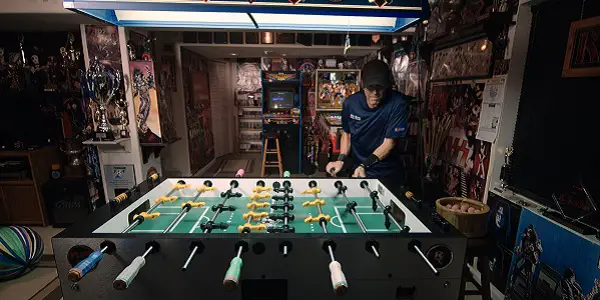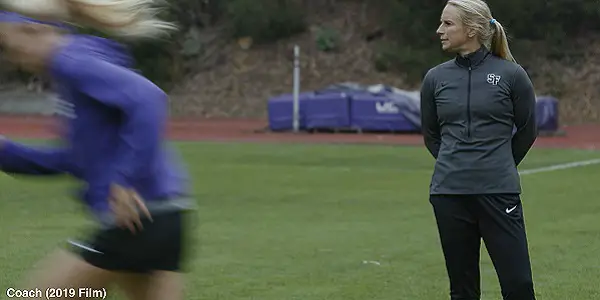Kicking + Screening Soccer Film Festival 2019 Roundup: From Foosball To Frankfurt & Beyond

Lee Jutton has directed short films starring a killer toaster,…
This year marked the 11th Annual Kicking + Screening Soccer Film Festival in New York, a milestone that festival co-founders Rachel Markus and Greg Lalas celebrated by focusing on the importance of the number 11 in the sport. After all, every soccer team fields 11 players at the start of a game (though finishing with all 11 still on the field is, as any soccer fan knows, not necessarily a guarantee). 11 years…11 players…and so, 11 films screened at this year’s festival, held over four consecutive nights at New York’s Scandinavia House.
As usual, fans of soccer and storytelling were treated to an eclectic mix of features and shorts highlighting stories of the beautiful game. While some of the films lacked the polish of others, passion for the subject shone through in them all: from the joy of seeing local heroes play on the world’s biggest stage to the struggle women face to be taken as seriously as men, from the euphoria that comes with winning your team’s first trophy in 30 years to…professional foosball? Yes, foosball. Below are some thoughts on the four films that served as the centerpiece of each night of the festival.
Foosballers (Joe Heslinga)
It’s almost a shame that the festival started on such a high note as director Joe Heslinga’s joyous, hilarious, and uplifting documentary exploring the world of professional competitive foosball – a world that I and the majority of the audience had no idea existed until the theater darkened and the film began. Needless to say, I had no idea what to expect from the movie and was a little confused as to how a documentary about table soccer found its way into this festival in the first place. Yet, by the time the closing credits rolled I was not only pleasantly surprised but outright impressed. Foosballers is one of the most entertaining documentaries I’ve watched in quite some time and was definitely the highlight of the entire festival. (I’m not the only one who thinks so, either – it was awarded the festival’s Golden Whistle for the best film.)
Foosballers follows some of the top table soccer players in the country as they prepare for the sport’s most prestigious event, The Tornado World Championships in Lexington, Kentucky. This colorful cast of characters includes Tony Spredeman, a second-generation foosballer and world #1 looking to defend his title; Ryan Moore, an award-winning cannabis grower looking for revenge after losing the title to Spredeman the year prior; Todd Loffredo, a pioneer from the “Golden Era of Foosball” in the 1970s who is now competing against players who grew up idolizing him; and Cindy Head, a retired cop who overcame a childhood of adversity by becoming the greatest woman foosballer of all time – and those are only a few.
Heslinga introduces us to the main characters as they each begin their own unique form of competition prep, including analyzing classic game footage and outlining tactics to take on each possible competitor – basically, what one would do to prepare for the world championships of any other, more conventional sport. From there, the film delves into the history of foosball and its period of glory in the 1970s and 1980s, before video games displaced table soccer as the activity of choice in bars and game rooms across the United States. These were the days when you could legitimately drop out of high school to make a living on the foosball competition circuit, raking in thousands of dollars in prizes. Very few of the game’s current stars can remember this era – with the exception of Loffredo, who dominated it. He and other legends of the game reminiscing about the glory days of foosball will make you nostalgic for that time even if you didn’t know it was a thing until that very moment.

Foosballers rides on a wave of quirky, absurd humor that can partially be credited to Heslinga’s background as a comedy writer and partially to the fact that the foosballers in the film are all genuinely hilarious and delightfully humble people. You are by no means laughing at them, you are laughing with them. The competition sequences that form the climax of the film are just as nail-biting as any World Cup soccer match, especially since the film ensures you’ve become personally invested in all of the players by the time the championships roll around. It might not sound like your cup of tea at the outset, but trust me – Foosballers is a highly entertaining film to take in if you get the chance to do so.
Special mention must also be given to my favorite short of the festival, which aired before Foosballers. Directed by Arnaud Guez, Now We Can Die in Peace follows two cops as they stake out a wanted criminal in their surveillance van during the 1998 World Cup final. However, when one of the cops leaves the other alone in the van with the game playing, their neatly laid plans quickly go awry. This marriage of cop thriller and soccer story results in a super funny little film that perfectly conveys how the sheer bliss of seeing your team win a championship can make everything else fade into the background.
The Return of the Cup (Jan Strasheim, Franzika Rappl and Bjorn Tanneberger)
I’m a huge fan of Germany’s soccer league, the Bundesliga – it boasts some of the most entertaining soccer and most fun gameday atmosphere to be found in the sport around the world. But in the United States, Bundesliga fanatics like myself are still fewer in number than fans of England’s Premier League or Spain’s La Liga; your average American has primarily heard of perennial champions Bayern Munich and not much else.
Eintracht Frankfurt are setting out to change that with a transatlantic charm offensive spearheaded by The Return of the Cup, a feature-length documentary chronicling how the underdog club beat Bayern in the final of the DFB-Pokal in 2018 to win the team’s first trophy in thirty years. And while the film is essentially a glorified Eintracht hype video – complete with almost comically dramatic music and many super-intense shots of an eagle flapping its wings – it’s also an enjoyable look at what it takes for a team to reach the pinnacle of success.
Nicknamed Die Adler, or the Eagles (hence the recurring eagle shots in the film), Eintracht are a historic and respected club known for having some of the most passionate fans in Europe – fans who will travel hundreds of miles round trip to cheer on their team even as the years without trophies continue to pile up. This unconditional love in the face of defeat – including a defeat in the DFB-Pokal final at the hands of Borussia Dortmund just one year prior to finally winning it – makes it easy to root for Eintracht throughout the film.
The Return of the Cup features numerous interviews with Eintracht Frankfurt players, board members, coaches and staff, and fans. The film provides a very interesting inside look at how teams prepare for big matches, including the speeches they give each other and the YouTube highlight videos they watch for motivation. However, the highlights are the interviews with Peter Fischer, Eintracht’s boisterous president, famous throughout Germany for his refusal to allow members of the far-right to be welcome at Eintracht games. Fischer is a man of many passionate opinions, a true character in a sport that sadly grows blander and more corporate with each passing year. When he boasts that he now knows he will never die of a heart attack, or he would have during the DFB-Pokal final, it’s impossible not to want to hug him.
Despite moments of pure cheesiness that only Germans could deliver so earnestly, The Return of the Cup is still a pleasant watch. It’s a good old-fashioned story of victory against the odds and a great introduction to the wonderful world of the Bundesliga.
Coach (Matthew Ellison and Jordan Axelrod)

Coach follows Tracy Hamm, then-head coach of women’s soccer at San Francisco State (now at UC Davis), as she heads to Wales to work on obtaining the most prestigious license in European football, the UEFA A license. Tracy chose to go the European route instead of pursuing the equivalent license through U.S. Soccer because she hadn’t played enough professional soccer to be able to bypass the lower-level licenses. Never mind that there was no professional league for women in the U.S. when Tracy graduated from college, or that she has built a successful career as a college and youth soccer coach – leaving that one box unchecked means that she is ineligible, while any male player just finishing up his professional career can slide right in without the same hefty investment of time and money.
I spoke with the executive producer and co-director of Coach in advance of the festival so that I could learn what it was that made Tracy’s story so compelling to them. Watching the film, I understood completely. Tracy is a bright, confident and driven woman who will inspire you as much as she does her players on the field. The strength she shows in being one of the only women to pursue the UEFA A license, dealing with casual sexism and almost unconscious disrespect from male colleagues along the way, is truly remarkable.

As a woman, it’s all too easy to relate to Tracy in Coach as she handles being constantly interrupted and mansplained to about the tactics of the sport to which she has devoted her entire life. Even if you have never played soccer – even if you have never watched it – you likely know what it’s like to be forced to prove how extraordinary of a woman you are just to be allowed to sit at the table with ordinary men. The lessons that the film carries about gender inequality and the roadblocks that keep women from achieving the same success as men apply in the boardroom as well as on the soccer field.
My one gripe with Coach is that I wanted it to be longer! The film clocks in at around 25 minutes, but I could have watched an entire feature-length film on Tracy and her journey from soccer-obsessed child to trailblazing coach. Hopefully, her story will inspire some real change behind the scenes at U.S. Soccer.
Soccertown USA (Robert Penzel)
The final night of the festival was by far the most rambunctious. Why? The film, Soccertown USA, explored the unique culture in the nearby town of Kearny, New Jersey that has earned it a reputation as the capital city of soccer in the United States. Many people with personal connections to the filmmakers and figures highlighted in the film were in the audience, and they weren’t shy about cheering their friends and acquaintances when they appeared onscreen. This lent the whole evening the air a midnight showing of the latest Marvel movie as opposed to a screening of a documentary on soccer, which was definitely a fun way to end the festival.
Soccertown USA explores how Kearny’s background as a working-class town built by immigrants passionate about the sport of soccer led it to become a hotbed for domestic talent at a time when soccer was a mere afterthought for most of America. The film focuses on three Kearny boys who went on to star for the United States at the 1990 and 1994 World Cups: John Harkes, Tab Ramos and Tony Meola, all of whom share their recollections in the film along with family members, teammates, friends and others. The combination of these funny and insightful interviews with archival footage from an era of soccer that I myself don’t even remember was both eye-opening and entertaining.
Kearny’s vibrant street soccer scene ensured that these boys not only could play soccer from morning until night but also had the freedom to develop more creativity in their game. The passionate following that the championship-winning high school soccer team had made success on the pitch all the more desirable. The New York Cosmos of the North American Soccer League played practically in their backyards at Giants Stadium, making it easy for them to watch legends of the game like Pele and Beckenbauer and to see a future for themselves as professional soccer players. But when the league folded in 1984, things become a little more tenuous. Guys like Harkes, Ramos and Meola had the talent and the drive, but when and where were they going to get to shine?
After a brief outing at the 1990 World Cup in Italy – the United States’ first appearance on soccer’s biggest stage since 1950 – earned them respect, albeit no wins, the 1994 World Cup on home soil loomed on the horizon. Soccertown USA builds up to this tournament, specifically the match against Colombia in which the U.S. shocked the tournament favorites to come away with a win. The success of that World Cup led to the formation of Major League Soccer, the domestic league that exists in the U.S. to this day and continues to thrive. Soccertown USA takes the long, winding road of the growth of soccer in this country and ties it to one small town and the phenomenal talents it spawned.
Obviously, Soccertown USA is going to have a special appeal for any soccer fan from the New York-New Jersey metropolitan area. But even if you hail from the other side of the country, you’ll likely enjoy learning about the dawn of the sport’s modern era in the United States.
What do you think? Which of the films described above sounds most appealing to you? Share your thoughts in the comments below.
Does content like this matter to you?
Become a Member and support film journalism. Unlock access to all of Film Inquiry`s great articles. Join a community of like-minded readers who are passionate about cinema - get access to our private members Network, give back to independent filmmakers, and more.
Lee Jutton has directed short films starring a killer toaster, a killer Christmas tree, and a not-killer leopard. Her writing has appeared in publications such as Film School Rejects, Bitch: A Feminist Response to Pop Culture, Bitch Flicks, TV Fanatic, and Just Press Play. When not watching, making, or writing about films, she can usually be found on Twitter obsessing over soccer, BTS, and her cat.













